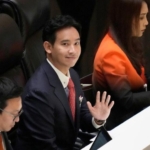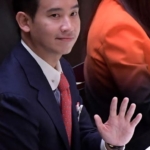
In the high-stakes world of politics, some issues are like the infamous third rail, electrified with potential danger. Politicians who touch them risk losing their jobs and being overthrown by enraged voters. The same may be said for controversial topics like Social Security in the US or lèse-majesté in Thailand.
Pita Limjaroenrat, the progressive Move Forward Party’s candidate for prime minister in Thailand, put himself in danger when he decided to address the delicate subject of lèse-majesté, a rule that punishes anyone who offended the royal family. The law’s ambiguous language and expansive interpretation have raised issues on a national and international level, with many people falling prey to its abuse.
Young progressive Thais who participated in the pro-reform demonstrations in 2020 supported Move Forward’s request to repeal Article 112, the notorious lèse-majesté statute. To maintain the faith of its supporters and its apparent public mandate for change, the party was considered as needing to adhere to its ideological commitment to discussing politically taboo topics, especially Article 112.
The party’s plan was dangerous and ambitious, though. After their electoral victory, it was anticipated that they would gain political capital and popular support, which would sway some conservatives to favour a Move Forward-Pheu Thai coalition government. However, their boldness in suggesting budget cuts to Crown-affiliated institutions and their tenacious pursuit of Article 112 reform sparked resentment from a powerful establishment with a track record of extra-constitutional involvement and sanctioned manipulation.
It’s possible that Move Forward’s situation could have been improved by taking a more practical tack. Before tackling such a divisive matter, they might have temporarily stalled Article 112 revision to gain political clout. Furthermore, the necessity for caution and strategic thinking was highlighted by Pheu Thai’s pursuit of a more realistic course and their efforts to win over voters from the working class.
The historical polarisation of conservatives and liberals, with the monarchy historically identified with anti-Communism and dissenters regarded as subversives and traitors, was a fundamental obstacle that Move Forward had to overcome. The use of protest movement iconography by the party heightened conservative opposition.
Keep Reading
Move Forward’s problems were only made worse by Thailand’s problematic legal system and the Constitutional Court, which is heavily conservative. Any attempt to overthrow the monarchy in a nation where the concept of “nation, religion, and king” is thoroughly ingrained is met with vehement opposition from those who believe that the King should be above politics and those who support conservative causes.
Pita and Move Forward risked their political future by daring to step on Thailand’s third rail. While their pursuit of Article 112 reform may have raised awareness of the problem and helped them win elections, it also put them in danger in an unfavourable political context. The current debate is whether Move Forward will meet the same demise as its predecessor, Future Forward.
Ultimately, this circumstance emphasises how difficult it is for politicians to compromise between idealism and realism. Politicians must negotiate the political terrain with foresight, strategic preparation, and a deep awareness of the repercussions of touching the third rail while fervently seeking reforms that reflect the people’s ideals. In this high-stakes political environment, only time will tell how far the establishment will go to safeguard its interests and what fate Move Forward will face.
























